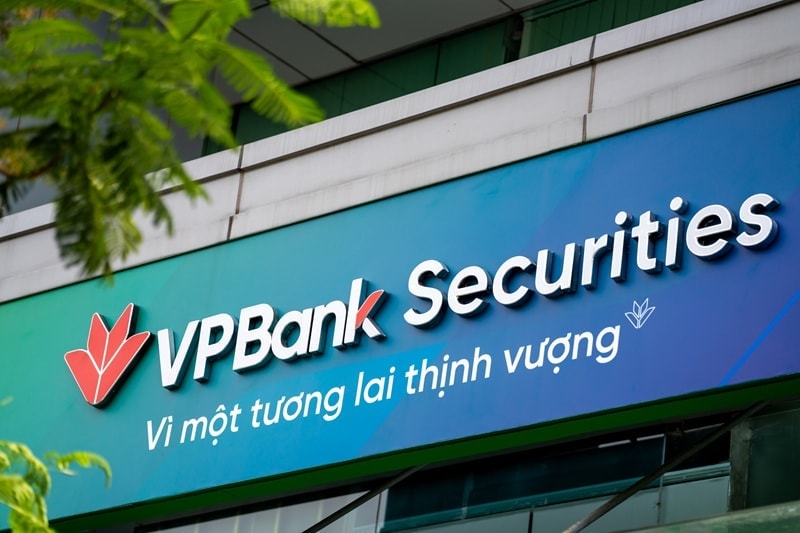Securities firms race into Vietnam’s crypto market
Many banks and securities firms are expanding into the crypto-asset business. What advantages do enterprises have in seizing opportunities on this new field?

Many securities firms with parent banks as “sponsors” are joining the crypto-asset market.
Banks Take the Lead in the New Market
Military Bank (MB) has signed an agreement with South Korea’s Dunamu Group at the Vietnam–Korea Business Forum in Seoul to jointly develop the first domestic digital-asset exchange in Vietnam.
Under the agreement, Dunamu will serve as a strategic partner, supporting MB in building an internationally compliant digital-asset trading infrastructure, improving the legal framework and management mechanisms, and developing investor protection solutions.
At the same time, securities companies backed by parent banks, such as TCBS and VPBS, have also announced the establishment of subsidiaries to enter the crypto-asset market. These firms enjoy advantages from their parent banks’ ecosystems and affiliated companies. They are also known for their large-scale capital, assets worth trillions of dong, and leading technological infrastructure.
For TCBS in particular, the firm has attracted nearly 1 million retail clients in recent years thanks to its strong integration within the Techcombank ecosystem. Its most important strength remains the backing of its parent bank.
To prepare for digital-asset trading, TCBS has already integrated a crypto-asset price board into its online securities platform, listing 100 digital tokens such as BTC (Bitcoin), ETH (Ethereum), XRP, BNB, DOGE and others. However, the current crypto price board only serves monitoring purposes, displaying price, trading volume, market capitalization, liquidity ratios, etc.
Meanwhile, VPBank Securities (VPBankS) is completing final procedures to participate in the crypto-asset exchange pilot. Supported by its parent VPBank, VPBankS has also approved plans for an IPO and listing on HoSE. After the IPO, its charter capital is expected to rise from VND 15 trillion to VND 18.75 trillion, placing VPBankS among the top three securities firms in Vietnam. This increase is expected to fuel growth not only in the capital market but also in the future crypto-asset market.
Securities Firms Expand from Their Ecosystems
Beyond bank-backed firms, many other securities companies are eager to enter this new “playing field.” The competition is heating up with familiar names such as SSI and VIX.
SSI has established a subsidiary, SSI Digital Technology (SSID). In early August, SSI Digital and Kyros Ventures co-organized GM Vietnam 2025, a large-scale event on blockchain and digital assets. Earlier, in June 2025, SSI subsidiaries signed strategic cooperation agreements with Tether, U2U Network, and Amazon Web Services (AWS).
According to the agreements, SSI Asset Management (SSIAM) and SSI Digital (SSID) will work with Tether — the world’s largest stablecoin issuer — to promote digital-asset infrastructure and share technical expertise in Vietnam.
VIX Securities has also become one of the founding shareholders of VIXEX, a crypto-asset exchange joint-stock company, holding a 15% stake. FTG Vietnam JSC, the largest shareholder with a 64.5% stake, also has past links with VIX.
Commenting on the entry of banks and securities firms into the crypto sector, SSI stated that the establishment of a new legal framework for digital assets opens up opportunities for building a modern financial ecosystem. This will foster the development of digital assets and regulatory frameworks for this promising investment channel, positioning Vietnam as an emerging force in the global digital economy.
Financial Centers and Regulatory Moves
Regarding securities firms’ operations in financial centers, the Ministry of Finance is drafting a new decree on policies for international financial centers. The draft proposes a minimum capital requirement of VND 5,000 billion for securities firms to qualify for establishment and business operations in these centers.
The draft also stipulates that foreign investors must commit at least USD 190 million in capital to participate in this sector. Additionally, both domestic and foreign securities firms must demonstrate continuous operation, no accumulated losses, and profitability for two consecutive years prior to applying for licenses. New entities must also ensure a charter capital of at least VND 800 billion, employ a general director, and have at least 10 licensed securities professionals.
Enterprises established in these financial centers may engage in activities such as brokerage, investment advisory, proprietary trading, underwriting, and fund management. However, they are prohibited from directly or indirectly providing financial services, support services, or financial products to customers outside the jurisdiction of the financial center.
According to SSI Chairman Nguyen Duy Hung, the company has been meeting with major financial institutions to explore investor demand and expectations, anticipating the establishment of international financial centers in Ho Chi Minh City and Da Nang.
The National Assembly’s Resolution on developing international financial centers in Vietnam, adopted on June 27 and effective from September 1, outlines plans to build centers in both Ho Chi Minh City and Da Nang. The centers will share a unified regulatory framework but develop specialized products based on local strengths. Ho Chi Minh City will focus on capital markets, banking, currency, fintech sandboxes, and dedicated exchanges, while Da Nang will emphasize green finance, fintech, and digital services.








